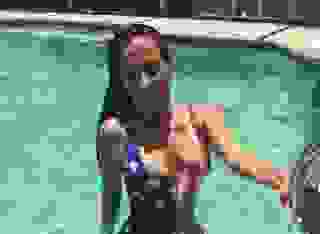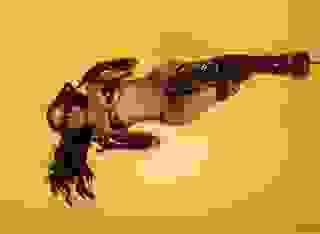- Novels and Novellas
- Jack Be Quick Ch. 06
Note: You can change font size, font face, and turn on dark mode by clicking the "A" icon tab in the Story Info Box.
You can temporarily switch back to a Classic Literotica® experience during our ongoing public Beta testing. Please consider leaving feedback on issues you experience or suggest improvements.
Click hereIf you haven't read the earlier chapters you really ought to go back and read them now. Without them you're going to be completely lost.
In case you missed my earlier warnings, there isn't any explicit sex in this story. Even if you didn't miss my earlier warnings, there's no explicit sex in this story. Look, there are a lot of gifted writers on Lit, writing about juicy, quivering sex. What are you hanging around here for?
Hans
*****
It's never easy to predict how long it will take to go from blank monitor screens to finished computer code, but we had a plan of sorts, with not just one deadline but dozens of them. Not surprisingly, the actual accomplishments had lagged behind the plan in a lot of areas. Problems were uncovered that had not been anticipated. To make it worse, the architecture had been tweaked here and there, in some cases making hundreds of lines of code useless, and in a couple of cases making a small task into a much larger one.
Some things just took longer than we expected them to, and some of the programmers simply didn't work as fast as we had expected. That's a common problem, but to people who live in a digital world, it's easy to lose sight of it. Not every pitcher in a bullpen can throw a 95 mph fastball, and not every running back can go 40 yards in four seconds. But with Jim at the helm, and with me pitching in everywhere I could to assign tasks, help, organize, and encourage, we were able to pay attention to personal quirks and work around them, and the payoff was that we were gradually catching up. Overall, we had been at least three months behind when Jim came on board. I was tracking our performance in great detail, and probably had too much information to make a blanket statement, but I judged that we had pulled ahead by a month or so, and that we'd be on schedule by the end of the year. Equally important, if we could finalize some pending decisions on the next two major parts of the system, Jim and I could plan the work on the new modules, and get a head start on them as people became available. So I was getting antsy for the big picture of the next year's work to be presented to our advisory committee, and get their blessing so we could go ahead. A few of the modules were so basic that no committee decisions could change them, and I had worked on the planning for them whenever I had a few minutes. Others were more iffy, but I was thinking about them, too. In general things were going well, but I was feeling the pressure that came from a dozen different directions.
One morning I was sitting down to a cup of coffee and Trudy asked, "What's retromerge?"
I tried not to look as if I'd just been hit in the face with a baseball bat, and replied, "What? Where'd you get that word? What does it mean to you?"
"Nothing. That's why I asked you. You were talking about it in your sleep, around two in the morning."
"Oh, shit! Do I do that often?"
"No, and usually when you do it's just a mumble. But this time you were talking pretty clearly. It sounded like an argument with somebody who thought you were making a mistake and should go another way."
"Oh, boy! This stuff is supposed to be kept in the lab, with no mention of any of it outside the buzzer door. You see what can happen? Look, there's nobody around here almost all day. Everybody's in class or at the library or wherever, and anybody could just walk in here and bug the place, and then record every word that's said while we sleep."
"But Jack, you can't predict what you might say when you're dreaming. Nobody can. But I can understand how somebody can pick up a word like that and wait till they hear it again, and eventually they can figure out what's going on. Sounds like a problem to me."
"I've gotta call Jerry right away. And Jim. This could be big. I could get thrown off the team."
An hour later, Jim and I were at our back table at the Goose telling Jerry about our dilemma. "So you dropped a loaded word in your sleep," Jerry said with a chuckle. "Happens to all of us, some time or other. Guess you'd better sit up all night and give up sleeping, Jack."
Jim looked grim. "What do we do, Jerry? I can see how this could happen to any of us. You're the expert. What's the answer?"
"Let's learn from history. When the atomic bomb project was going on during World War Two, this sort of problem was worried over at very high levels of our government. And we weren't the only ones who worried about this. The Brits and the Germans had their own concerns about loyal people accidentally leaking secrets. They all settled on a simple solution, one that can have variations and versions to suit the project, the threat, and the personalities. Everything was coded. There was no atomic bomb, there was The Manhattan Project. The thing that devastated Hiroshima was Little Boy. Then they dropped Fat Man on Nagasaki, and the war was over.
"Actually this code word business goes back at least to World War One. The British were working on a new type of vehicle to use against an entrenched enemy. It had big tracks that made it able to climb out of holes, go over logs, and take the battle to the enemy no matter what he was hiding behind. But they couldn't call it a tractor or a truck without giving away the secret, so they told everybody they were working on big tanks, but they didn't say tanks of what. The new secret weapons needed massive amounts of steel plate, and the German spies bought into the idea that the Brits were building big steel tanks, for some kind of liquid. The idea of the tanks themselves didn't excite them, because they thought the real secret was what they were going to fill them with, so their spies spent their time and energy looking for the wrong thing. There was even a rumor that the tanks would be full of molasses, which would flood the trenches and get everybody bogged down. It was a brilliant job of misdirection. When the new secret weapons were turned loose in France, the German troops panicked at the thought of being crushed in their trenches by these giant machines, and the high command was just as panicked because they hadn't prepared any defensive measures to stop them. So the things called tanks were such a huge success that the name has stuck for almost a hundred years.
"Now how can you take that approach and adapt it to your project?"
Jim and I looked at each other, each of us hoping the other had an idea, but our faces were blank. I spoke up first. "Jerry, I think that train has already left the station, because you've let everybody know we're working on a new counter-espionage system. We've been the bait for your spy fishing game, so we've lost our chance to act as if this is something different, like a new approach to inventory control or production scheduling or whatever. I like the idea of code words, but they're going to know right off that they're code words and they won't misdirect anybody unless we can think of something very clever. We could name all of our modules after cities, for example, like Tulsa and Seattle and Topeka and Austin, but if I start talking in my sleep about having trouble mating Cleveland with Omaha, pretty soon the spy who's listening is going to catch on."
I could tell from Jim's frown that he was digging deep for inspiration. Then his face brightened and he laid the cornerstone of our solution. "Look, everybody has to go grocery shopping from time to time. Let's name everything we have for an item in a supermarket. The one around the corner from my apartment has a big book behind the customer service counter that they look stuff up in if I want to know whether they carry it or where they hid it. It's a huge computer printout, the size of a big city phone book. Can you get us one of those books so we have all the names? That way, a programmer can be mumbling about carrots or toothpaste, and it won't give away anything. The sheer variety of the code names ought to make it hard to figure out what's going on, with produce and canned goods and light bulbs and toilet paper all mixed in together."
Jerry jumped right in. "I bet I can get you one of those lists, say from WalMart or Costco or some other big store that handles everything from tomato soup to car batteries. I'll get on it today. You guys brief Glenn for me, and I'll get back to you as soon as I have my hands on a list."
* * * * * * * * * *
The very next afternoon Jerry showed up with our list. I used an ordinary utility program to seed random number generation from the time, and assigned a long, unique ID number to every module we were working on, to be buried deep within the module. Anybody on the outside who had one of the ID numbers would have no way to associate it to a programming task. Then the random ID numbers were broken apart to represent page numbers in our commodity list and locations on the page. I recruited Trudy to come in at night and look up the name of the commodity corresponding to each number and write it down in the margin of the printout. Two nights later, we had all of our code names, plus the methodology to assign new ones as the project grew.
Then came the challenge: inducing a roomful of nerds to shuck loose of sensible labels that they knew and learn to use names of groceries for their work assignments. Jim handled the motivation step, and he did a good job of warming up our audience. Then I explained that the names would sound silly, and they could have some fun with them. It's hard to get angry or resentful over something absurd or amusing, and once they smiled I knew I had them. I knew that Bruno and Helen were working on modules that connected, and I had met with them a couple of times, going over how their outputs played together. So I broke the news that Bruno's assignment was named Crookneck Squash. "Now suppose we call Helen's job Zucchini. Anybody at all can tell that they go together somehow, can't they? So that's not a good idea. But the way we've named the jobs, only Bruno and Helen would know why there's a tricky compatibility between Crookneck Squash and Phillips Screwdriver."
Helen looked shocked. "You mean I'm working on Phillips Screwdriver?"
"Yes, and you're the only person who is. It's an honor to be assigned to something as complex as Phillips Screwdriver, so carry that name with pride. It's every bit as complicated as Concord Grape Juice, that Ames is working on."
By this time the absurdity of the names had hit home and everybody was laughing. I had them all get in line and come up to me so I could give them their code names. Connor read his and let out a whoop. "Hey, mine's Oreo! I love it!" he yelled, waving his slip of paper over his head. Everybody had a few chuckles and went back to work, smiling over their grocery names and not thinking about the fact that a dedicated spy would have to try to extract secrets from our programmers directly if he wanted to get any information about our project. That would have to be Jerry's next headache.
* * * * * * * * * *
The worst problem with depending on a gun for protection is that you have to carry it. If you're in a stall in the men's room and the gun is locked in your desk drawer, you're defenseless. Furthermore, anybody who knows you carry a gun will try to figure out when you won't have it within arm's reach, and that's when you'll be attacked. This had all been drummed into our heads by Kirk, back at Red's security shop. So Trudy and I had worked out all sorts of arrangements to keep our protection within reach or else cover for each other. Remember in Marathon Man, when the spies go after the hero while he's in the bathtub? Or in that western where the bad guy goes after Clint Eastwood's buddy when he's taking a bath, only to get shot by a revolver that he's taken into the tub with him?
Trudy and I weren't movie stars or quickdraw experts, but we took our security seriously, and thought our problems through and planned for the worst. I recall a one line gag that Richard Armour wrote for the old Saturday Evening Post, "Your chance of being eaten alive by a leopard on main street is only one in a million, but once is enough." So we practiced at the range, kept our guns clean and oiled and loaded with fresh ammunition, and planned carefully for every situation when a bad guy might assume that we'd be vulnerable.
In our bathroom we had a hook in the shower stall on the side opposite to the shower head, and we made a thing we named 'the bee's nest' that we'd hang on the hook with a pistol inside of it, completely protected from the water but easy to draw by reaching up from the bottom, even if we had soap in our eyes. At night, we both took our guns to bed with us, but you'd never be able to tell that by looking. If one of us got up during the night, we woke the other one first, so we'd be covered. During the day, each of us knew where the other one was at all times, thanks to text messages on our cell phones.
The point is that we knew this wasn't a game - our visit to Utica had demonstrated that - and we had resolved never to let our guard down. In case we needed to be reminded, on the top of our tall chest of drawers in the bedroom Trudy had placed a little plaque, bearing the words "Eternal vigilance is the price of liberty!"
I dropped Trudy off at the library one Thursday morning, as I usually did. She gave me a kiss, picked up the backpack that held her books and personal stuff and swung out of the car, being careful to keep her vest from flying open because it hid the shoulder rig that carried her loaded pistol plus two spare magazines. She was as professional about it as a seasoned detective, and I watched her walk away from the car for a few seconds, admiring her and thinking what a lucky man I am. Then I headed for the lab, where I planned on reviewing the progress of about a quarter of the staff, leaving the afternoon free to concentrate on whatever problems the morning's conversations might have revealed. Traffic was just what it always was at that hour, and I eased along with the flow, trying not to waste a lot of energy fighting the tide of vehicles.
A traffic light turned red when I was in the middle of a block, in bumper to bumper traffic. When it changed to green the cars were starting to move forward when a guy with a scraggly beard jumped up and landed with a belly flop on the hood of my car. I immediately jerked the wheel to the left and hit the brakes hard, which threw him off on the left side of the car. While he was sliding across the hood, I wrenched the wheel to the right and slammed the accelerator down to mount the curb at a point where there weren't any pedestrians. At the same time I pushed the panic button in the cross spoke of the steering wheel, to signal the FBI that I was in trouble. A blue Toyota swung in from the next lane to cut me off, but I was already on my way to the sidewalk and leaning on the horn to clear a path ahead. Then the Toyota reversed suddenly, curving around to back to nail my left rear wheel, but I was able to avoid contact by inches and get fully up over the curb. Then I drove around a streetlight pole and onto the next cross street, which went at ninety degrees to my original path. The last car on that street that had made it through the intersection as the light changed, was thirty yards ahead. I had a clear path, so I kept the horn blaring and laid some rubber.
One of the things we had done when we became consultants was to go over every foot of pavement in our part of Cambridge, over and over, in the wee hours of many mornings. So I knew just where to find a police station, and what the sidewalks looked like, as well as the streets. We'd committed to memory the arrangement of the traffic lanes, where there were extra lanes and where the pavement narrowed by dropping off a lane at the curb. I glanced at the mirror and saw that the blue Toyota had made it around the corner and the driver was hard on the gas pedal, twenty yards back. I slowed down, watching the oncoming traffic and moving to the middle of the street. The Toyota's driver decided to pass me on the right, so that when he pulled up alongside he could shove me over into a head-on collision. His front bumper was just pulling even with my rear one when I stomped the brake and shifted into reverse. Then I let that big engine squeal the tires as the car stopped and flew back two car lengths. I immediately shifted back to drive and cut to the right behind the Toyota, and down a small side street that I knew led to the back of a police station. That was where the squad cars parked, nosed in to the curb. I spotted two adjacent empty parking spaces, slid to a stop, and backed in. That left me headed out and facing any possible threat. Then I pushed the FBI panic button again and again, to signal the urgency of the situation and make it easy for them to find me on their computer screen.
A uniformed policeman who had just come out of the door looked at me and drew his gun as he hustled over to my car. By the time he got there I had my window down and was holding my FBI card up as I screamed, "Call for help, quick. And watch for a blue Toyota!" Then it all happened at once. The Toyota came up the street going the opposite direction from the way I had come, crossing in front of my car from left to right. A man was leaning out of the front passenger window with a funny-looking pistol in his hand. I ducked, unlatched the door with my left hand, and gave it a shove with my shoulder, just as he started to spray bullets in a diagonal line from my right front fender to the top of the windshield on the left side. So much glass was flying inside the car that it seemed the air was full of little chunks of it. My dive for safety took me out onto the pavement. I was on the ground, clutching my pistol, wondering what would happen next, when I heard tires screech and the Toyota came backing up for a return engagement.
I lay flat on the ground and looked under my front bumper, holding my pistol tight with both hands. Mentally, I was back in the batting cage with my father. The guy with the funny looking gun was obviously looking for me in the driver's seat, looking through and around the remains of my windshield. That kept him from seeing me down on the ground. He held his gun out straight, ready to blow my head off as soon as I looked up over the steering wheel. He was not quite directly ahead of my car when my line of sight gave me a pretty good view of his head, and I fired at his right temple. The angle was tricky and I was far from comfortable down under my car, but the range was only about ten feet so I had no trouble making the shot. His body straightened up a bit on the impact, and I got off a shot at his neck, just above the top of his breastbone. Then, as he lifted a little more and twisted to his right, he was facing straight toward me and I shot at the middle of his chest. By that time I was really exposed to him, and if he'd still been able to pull the trigger I'd have been just a blob on the pavement. But as his body was straightening up, his arms were relaxing and the gun in his hands was moving downward, so by the time I shot him in his chest the muzzle was already pointing down at the ground. As the Toyota continued to back up he slumped right down over the windowsill and his gun fell to the pavement.
One of my bullets, I think it was the second one, had gone through the gunman and shattered the windshield in front of the driver. He jerked, glanced quickly at his partner, and lurched into drive and laid some more rubber getting out of there. The sound of sirens was filling the air by then, and one sounded very close. Off to my right, where I couldn't see it, the Toyota ran head-on into a police car that was rounding a corner, and parts of cars flew everywhere, bouncing off buildings and clattering onto the street. I made myself as small as I could, looking around under the car and hoping there weren't any more bad guys coming to get me.








